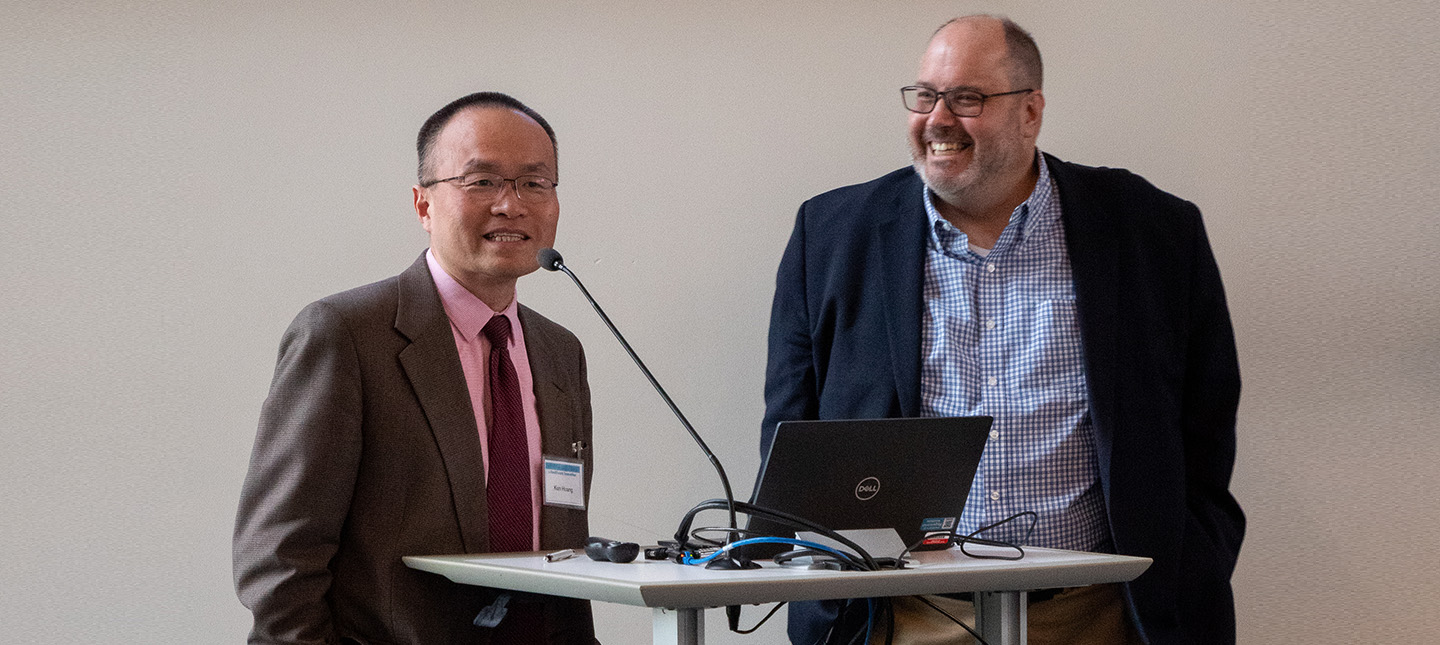Professionals from health departments, hospital systems, universities and research organizations came together for a three-day artificial intelligence conference at Regenstrief Institute to better understand the current and future state of this technology. Topics included advancements, including successful use cases, ongoing challenges and innovations in healthcare.
“Artificial Intelligence in Healthcare Innovation: Moving from Reactive to Proactive,” April 25-27, 2023, was organized and led by Regenstrief Research Scientists Shaun Grannis, M.D., and Kun Huang, PhD. Dr. Grannis is vice president of Data and Analytics at Regenstrief. Dr. Huang serves as chair for the Department of Biostatistics and Health Data Science at the Indiana University School of Medicine. This was the third annual conference and the first of the events to offer an in-person option. Nearly 200 participants registered, representing 96 organizations across 30 states and seven countries.
The conference also served as a platform for networking and collaboration. Attendees had an opportunity to hear from a diverse range of experienced professionals from academia, industry leadership and researchers who are leaders in AI technology. Each day had a keynote speaker. They were:
- Kenneth D. Mandl, M.D., MPH, director of the Computational Health Informatics Program at Boston Children’s Hospital;
- Marc Overhage, M.D., PhD, the chief health information officer at Elevance Health, Inc.; and
- Abel N. Kho, M.D., a professor of medicine and preventive medicine at Northwestern University Feinberg School of Medicine.
Each day of the conference hosted a panel discussion, including one or more Regenstrief research scientists who shared insights on topics such as machine learning, natural language processing and robotics. Attendees were able to connect, share ideas and collaborate on projects that could advance the field.
The Regenstrief research scientists and affiliated scientists who presented during panel discussions are:
- Michael Weiner, M.D., MPH
- Wanzhu Tu, PhD
- Titus Schleyer, DMD, PhD
- Kosali Simon, PhD, M.A. (Affiliated Scientist)
- Andrew Gonzalez, M.D., MPH
- Randall Grout, M.D., M.S.
- David Haggstrom, M.D., MAS
- Joshua Vest, PhD, MPH
- Suranga Kasturi, PhD (Affiliated Scientist)
About Regenstrief Insttute
Founded in 1969 in Indianapolis, the Regenstrief Institute is a local, national and global leader dedicated to a world where better information empowers people to end disease and realize true health. A key research partner to Indiana University, Regenstrief and its research scientists are responsible for a growing number of major healthcare innovations and studies. Examples range from the development of global health information technology standards that enable the use and interoperability of electronic health records to improving patient-physician communications, to creating models of care that inform practice and improve the lives of patients around the globe.
Sam Regenstrief, a nationally successful entrepreneur from Connersville, Indiana, founded the institute with the goal of making healthcare more efficient and accessible for everyone. His vision continues to guide the institute’s research mission.
About IU School of Medicine
IU School of Medicine is the largest medical school in the U.S. and is annually ranked among the top medical schools in the nation by U.S. News & World Report. The school offers high-quality medical education, access to leading medical research and rich campus life in nine Indiana cities, including rural and urban locations consistently recognized for livability.









